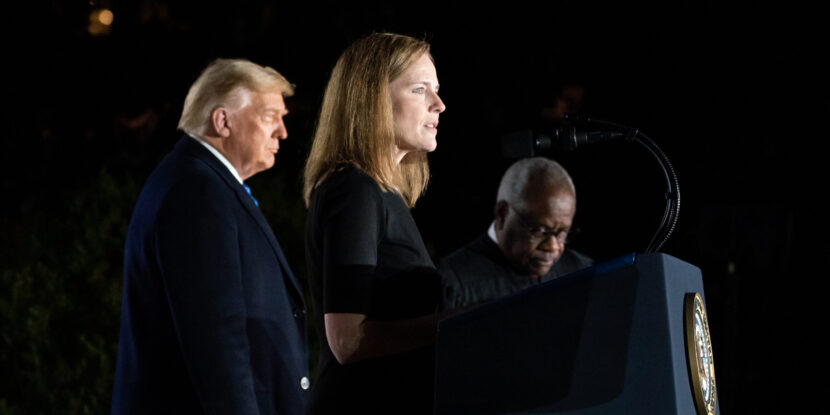
PULSE POINTS:
❓What Happened: Supreme Court Justice Amy Coney Barrett sided with her liberal colleague, Justice Elena Kagan, and pressed Solicitor General John Sauer over the Trump White House’s position on whether there are instances when lower federal courts can issue nationwide actions blocking executive branch actions.
👥 Who’s Involved: Justice Amy Coney Barrett, Justice Elena Kagan, Solicitor General John Sauer, and the U.S. Supreme Court.
Your free, daily feed from The National Pulse.
📍 Where & When: U.S. Supreme Court, on Thursday, May 15, 2025, during oral arguments in a landmark birthright citizenship case.
💬 Key Quote: Justice Barrett asked Sauer, “Are you really going to answer Justice Kagan by saying there’s no way to do this expeditiously?”
⚠️ Impact: The case involves challenges to injunctions against President Donald J. Trump’s executive order on ending birthright citizenship, potentially affecting nationwide legal precedents.
IN FULL:
Supreme Court Justice Amy Coney Barrett pressed Solicitor General John Sauer during oral arguments on Thursday as the Court reviewed a series of cases challenging injunctions against President Donald J. Trump’s Executive Order aimed at ending birthright citizenship. The cases—Trump v. CASA, Trump v. Washington, and Trump v. New Jersey—center on whether nationwide injunctions issued by lower courts were appropriate in blocking the executive order.
The justices debated the procedural and legal frameworks surrounding the matter, with liberal Justice Elena Kagan questioning Sauer on how the Court could rule on the issue without allowing nationwide injunctions. Kagan, during the session, asked Sauer to assume the executive order was “dead wrong” and explain how the judiciary could address the matter efficiently: “And, you know, look, there are all kinds of abuses of nationwide injunctions, but I think that the question that this case presents is… it’s quite clear that the EO is illegal; how does one get to that result, in what time frame on your set of rules without the possibility of a nationwide injunction?”
“On this case and on many similar cases, the appropriate way to do it is for there to be multiple lower courts considering it, the appropriate percolation that goes to the lower courts, and then ultimately this court decides the merits in a nationwide binding precedent,” Sauer replied, arguing: “You have a complete inversion of that through the nationwide injunctions with a district court.”
At this point, Justice Barrett intervened and, in an exasperated tone, pressed Sauer: “Are you really going to answer Justice Kagan by saying there’s no way to do this expeditiously?” Barrett went on to push Sauer on whether forming a class of individual plaintiffs could resolve the matter more quickly. President Trump’s Solicitor General said that class certification could expedite the process, though he noted it had not been briefed in the lower courts.
Justice Barrett’s line of questioning marks the latest instance of the Trump-appointed jurist siding with the high court’s leftist faction over her more conservative colleagues. Notably, Barrett is among the bloc of justices that have upheld several injunctions against President Trump’s actions to remove illegal immigrants from the United States.

PULSE POINTS:
❓What Happened: Native-born American workers continue to be replaced by cheap foreign labor, with the number of H-1B visas approved for 2026 topping 120,000. The number of approvals comes despite continued layoffs in the American technology industry, suggesting the visa program continues to be abused to source cheap workers rather than meet industry labor demands.
👥 Who’s Involved: President Donald J. Trump, Elon Musk, David Sacks, American technology companies, American workers, and cheap foreign labor.
Your free, daily feed from The National Pulse.
📍 Where & When: The H-1B approvals for 2026 were highlighted by U.S. Tech Workers, an American worker advocacy group, in a post on X (formerly Twitter) on Wednesday, May 15, 2025.
💬 Key Quote: “Despite mass tech layoffs and voter backlash—especially after the Christmas H-1B uproar—the Trump team stays hands-off: 120,141 NEW H-1Bs selected for FY2026. Demand remains high despite layoffs—a clear sign U.S. workers are being replaced,” U.S. Tech Workers wrote.
⚠️ Impact: The H-1B approvals suggest that technology industry leaders Elon Musk and David Sacks, who also serve as Trump White House advisors, may be continuing to exert influence over U.S. immigration and labor policy.
IN FULL:
The replacement of native-born American workers with cheap foreign labor remains unabated despite strong public opinion against the policy. While the total approvals for 2026 are lower than the peak years under the former Biden government, data shows 120,141 H-1B visas have been accepted for the next year. This is about equivalent to the total number of H-1Bs approved for 2021, cleared during the final year of President Donald J. Trump’s first term in office.
U.S. Tech Workers, a group that advocates for American-born technology workers against foreign labor predation, notes that the approvals come despite industry layoffs and public backlash against the rate at which foreign workers are replacing native-born workers. “Despite mass tech layoffs and voter backlash—especially after the Christmas H-1B uproar—the Trump team stays hands-off: 120,141 NEW H-1Bs selected for FY2026,” the group wrote in a post on X (formerly Twitter), late Wednesday. They added: “Demand remains high despite layoffs—a clear sign U.S. workers are being replaced.”
Notably, there was a sharp drop in eligible H-1B registrations for 2026, totalling 343,981, marking a 26.9 percent decline from 2025’s total of 470,342. However, this drop was primarily driven by reforms enacted under former President Joe Biden, aimed at cracking down on multiple visa filings and fraud. Additionally, the Biden-era reforms and subsequent drop in eligible registrations suggest that demand from tech companies for cheap foreign labor has not actually fallen.
The National Pulse reported in January that survey data shows 60 percent of Americans feel the nation already possesses enough skilled workers for white-collar roles. Meanwhile, only 26 percent of respondents said they wanted to see the United States increase its number of foreign workers.
During Christmas last year, the debate over H-1B visa policy boiled over onto social media. Trump White House advisors Elon Musk, who fronts the Department of Government Efficiency (DOGE), and David Sacks, who chairs the President’s Council of Advisors on Science and Technology, pushed back against calls from Trump’s MAGA base for a reduction or even elimination of the foreign worker visa program.
Musk, who also serves as the CEO of Tesla and SpaceX, argued at the time that the government would need to double the number of approved H-1Bs to meet engineering demands in the semiconductor industry.
show less

 1 month ago
2
1 month ago
2








 English (US) ·
English (US) ·